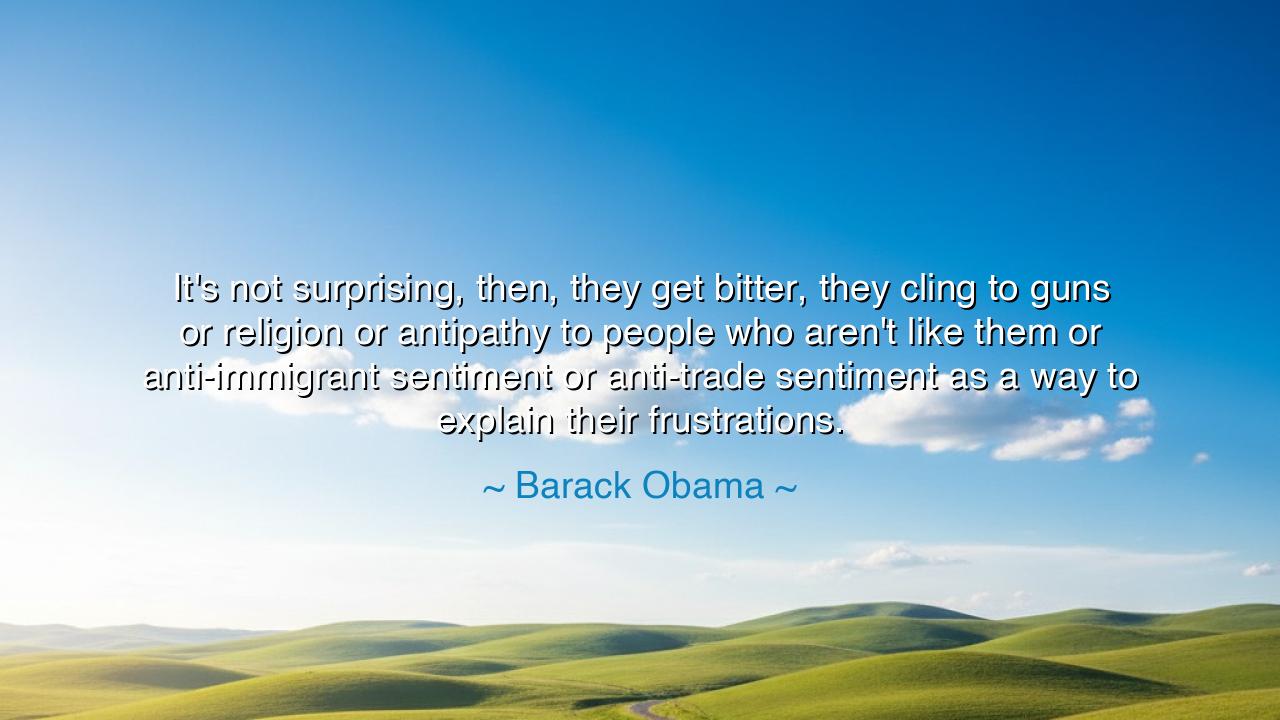
It's not surprising, then, they get bitter, they cling to guns or
It's not surprising, then, they get bitter, they cling to guns or religion or antipathy to people who aren't like them or anti-immigrant sentiment or anti-trade sentiment as a way to explain their frustrations.






"It's not surprising, then, they get bitter, they cling to guns or religion or antipathy to people who aren't like them or anti-immigrant sentiment or anti-trade sentiment as a way to explain their frustrations." These words, spoken by Barack Obama, strike at the heart of the deep divisions within society and the emotional responses to the uncertainty and frustration that many individuals face in the modern world. Obama’s reflection on why people may turn to guns, religion, or anti-immigrant sentiment reveals the inherent human need to seek something to hold on to in times of hardship, when change and fear threaten to overwhelm the individual. This quote reminds us that when people are disconnected from the forces that govern their lives, they often grasp at ideologies or weapons as a means of asserting control over their anxiety and discontent.
The ancients, too, were aware of how frustration and fear could lead people to cling to forces that seem to offer security, even when those forces are ultimately destructive. Plato, in his work The Republic, examined how individuals often retreat to familiar beliefs and rigid ideologies when faced with the challenges of an unstable world. He warned that societies may turn to false solutions—be it the strict control of rulers, the reliance on tradition, or the escapism of myths and ideologies—as a way to avoid confronting the deeper, more complex causes of their frustration. Plato’s critique of tribalism—the tendency of people to turn inward, finding safety in the familiar, rather than facing uncomfortable truths—resonates with Obama’s warning that many seek to cling to outdated or harmful beliefs when confronted with the turmoil of modern life.
In the life of Julius Caesar, we can see a historical example of how fear and uncertainty can prompt people to seek solace in ideologies that promise control. Caesar rose to power during a time of political instability in Rome, and he skillfully exploited the discontent of the Roman populace, presenting himself as a strong leader who would restore order. The people, weary from political strife and the unpredictability of their world, turned to Caesar, clinging to the promise of stability and security. Caesar’s rise shows how a society in turmoil can gravitate toward a figure who offers simple solutions, even if those solutions may lead to despotism. His authoritarian rule became a form of escape from the confusion and complexity of Roman politics, much as people today may turn to simplistic answers like guns or rigid ideologies when faced with a world they feel they cannot control.
The modern world, too, is no stranger to this phenomenon. In recent years, we have witnessed the rise of nationalist movements across the globe, as people turn to anti-immigrant sentiments, protectionism, and ideological purity in the face of economic dislocation, globalization, and cultural change. These movements offer a sense of security for those who feel left behind by the rapid changes around them, offering scapegoats—be it immigrants, foreign trade, or different cultures—as a way of explaining their frustrations. Much like the plebeians in Rome, or the discontented masses in ancient civilizations, modern individuals seek to cling to familiar, often misguided, ideologies to provide them with a sense of purpose and control in a world that seems increasingly chaotic and unpredictable.
But as Obama wisely points out, the frustrations people face are not solved by turning to these negative outlets. Clinging to guns, religion, or anti-immigrant sentiments only further isolates individuals and communities, leading to division rather than understanding. The ancient wisdom of Aristotle reminds us that the path to true fulfillment lies not in shutting ourselves off from the world, but in engaging with it honestly and with virtue. Aristotle believed that the best life is one of active participation in society, guided by reason and compassion, not one that retreats into the safety of rigid ideologies or the harsh grip of weapons. His words offer a clear lesson: we must face our frustrations with openness and engagement, seeking solutions through dialogue, empathy, and understanding, rather than retreating into divisive ideologies.
The lesson from Obama’s quote is that frustration and fear are natural human responses to a world that often feels beyond our control, but clinging to destructive ideologies only deepens the sense of alienation. When we feel disconnected from the larger world—whether through economic hardship, political instability, or cultural shifts—it is easy to turn inward, seeking comfort in certainty. However, the true solution lies in embracing understanding, dialogue, and the willingness to change. As Socrates taught, wisdom comes not from the certainty of our own beliefs, but from the willingness to question them, to listen to the other, and to find common ground.
In practical terms, we can combat these negative tendencies by fostering understanding and community. Instead of allowing our fears and frustrations to guide us toward isolation, we should strive to engage with different perspectives and cultures, to listen deeply to the concerns of others, and to seek out solutions that unite us rather than divide us. This requires the courage to step outside of our comfort zones and confront our own prejudices and misunderstandings. Let us remember that the path to overcoming frustration is not through clinging to weapons or ideologies, but through compassionate action, mutual respect, and a willingness to build a better world together.






AAdministratorAdministrator
Welcome, honored guests. Please leave a comment, we will respond soon